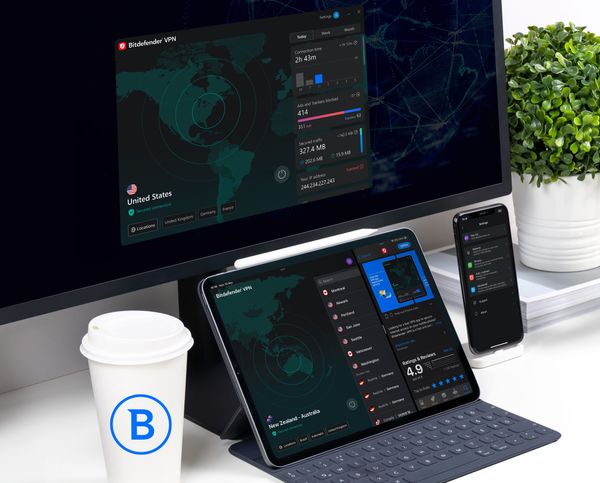Protect Your Privacy While Working Out: Gym Public Wi-Fi Networks Safety Tips

Working from home has driven some of us deeper into a sedentary lifestyle, so heading to the gym is now more important than ever.
If you work remotely, you may prefer to stay connected, especially if you’re trying to get in a full-body workout on your lunch break.
Fortunately, most modern gyms offer free Internet access in the form of public Wi-Fi networks, which is a plus if you must always be online.
On the other hand, haphazardly taking any opportunity for free Internet access could bring serious trouble for your privacy, especially if you work with sensitive data.
Although using mobile data to stay connected is a safe alternative, it’s also more expensive, which is why most users prefer a public Wi-Fi connection.
While using the public Wi-Fi network at your gym is not inherently wrong, it can expose you to many risks, including Man in The Middle (MiTM) attacks, traffic interception, tracking and profiling, and phishing. Here’s how you can deter most of them:
Use HTTPS
HTTPS is the first step you should take towards protecting your privacy, whether you’re using public Wi-Fi networks or not. HTTPS is paramount to keep your anonymity online because it encrypts data between you and the website you visit (provided it has HTTPS).
Connecting to an HTTP (not secure) website could expose sensitive data to attackers, including payment, banking information, credit card details, credentials (usernames and passwords), and private communications (emails, instant messages).
In contrast, connecting exclusively to HTTPS websites keeps such incidents at bay; HTTPS websites encrypt sensitive data, preventing snoops from deciphering it and using it against you.
Note that snoops can still see what websites you visit, even if you use HTTPS. However, they won’t know exactly what you’re doing there, whether it’s logging into your account, sending a message, or making an online payment.
Furthermore, HTTPS only encrypts browser data. Therefore, if you’re using other Internet-connected apps while connected to your gym’s public Wi-Fi network, you should be wary about their encryption capabilities.
Use a VPN
VPN services are excellent all-round privacy protection tools that can keep you anonymous even on the public Wi-Fi networks that you find in your gym, at airports in coffee shops and elsewhere about town.
A sturdy VPN solution re-directs your traffic away from the ISP’s network, making it difficult, if not impossible, for your ISP and other snoops to intercept and monitor your data.
It also encrypts your data so, even if attackers find a way to intercept your traffic, they won’t be able to make anything of it. VPN encryption algorithms make it nearly impossible to decrypt with current technology, significantly discouraging potential attackers.
As opposed to only using HTTPS, VPNs also hide the websites you visit, so your ISP can no longer see your online whereabouts. While you’re connected to a VPN server, your ISP can only know the address of the server you’re connected to, not the website you visit.
VPN services also re-direct and encrypt data from your entire device, not only from your browser. Therefore, you can safely browse, email clients, and even stream media without worrying about privacy violations while on your gym’s public Wi-Fi network.
Last but not least, modern VPN solutions such as Bitdefender VPN also encompass anti-tracking and ad-blocking modules, helping you evade online tracking and profiling effortlessly. With these features, you won’t have to worry about seeing disturbingly relevant targeted ads, announcements, and articles.
Working out and staying private go hand in hand
The bottom line is that connecting to public Wi-Fi networks, including trusted ones like the one at your gym, poses a risk to your privacy.
Keeping yourself anonymous online can help you easily fend off scammers, snoops, tracking and profiling.
While using HTTPS is highly efficient if you keep your Internet activity inside your browser, turning to a VPN tool such as Bitdefender VPN can give you system-wide privacy protection.
However, HTTPS and VPNs are not mutually exclusive, so our recommendation is to use both, if possible.
tags
Author

Vlad's love for technology and writing created rich soil for his interest in cybersecurity to sprout into a full-on passion. Before becoming a Security Analyst, he covered tech and security topics.
View all postsRight now Top posts
Fake Download of Mission: Impossible – The Final Reckoning Movie Deploys Lumma Stealer
May 23, 2025
Scammers Sell Access to Steam Accounts with All the Latest Games – It's a Trap!
May 16, 2025
How to Protect Your WhatsApp from Hackers and Scammers – 8 Key Settings and Best Practices
April 03, 2025
FOLLOW US ON SOCIAL MEDIA
You might also like
Bookmarks








